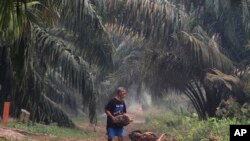Indonesia and Malaysia lost less tree cover in 2019 than the year before but continued to suffer some of the heaviest primary forest losses in the world, new data based on US satellite imagery show.
Cambodia and Laos also made the global top 10 and saw the sharpest spikes in year-on-year forest loss in Southeast Asia, according to images analyzed by the University of Maryland and released today by Global Forest Watch, a project of the US-based World Resources Institute.
The new data include total forest cover losses but focus on tropical primary forests, which typically hold the most carbon and biodiversity, making their loss especially damaging to the environment.
As in years past, Brazil lost the most primary forest by far in 2019 — 1,361,000 hectares. The Democratic Republic of the Congo and Indonesia followed, losing 475,000 hectares and 324,000 hectares, respectively. They were followed by Bolivia, Peru and Malaysia, which lost 120,000 hectares.
Despite the heavy toll, Indonesia lost slightly less primary forest than the year before for the third year running, suggesting that the country "may have turned a corner in its efforts to reduce deforestation," GFW said. Malaysia also lost less primary forest for the third straight year.
The data do not show whether the losses were man-made or natural. But past experience from tropical primary forests across the globe suggests that some 95 percent is consistently the work of man, said Arief Wijaya, climate and forest senior manager for WRI Indonesia.
Together, Indonesia and Malaysia grow about 85 percent of the world's palm oil, on plantations environmentalists blame for the clear-cutting of vast tracts of forest and the burning-off of much carbon-rich peat land in both countries. WRI attributes much of their recent gains in curbing forest loss to recent moratoriums on new clearing for palm oil and to tougher law enforcement to stop fires.
"In Malaysia and Indonesia, palm oil [is] really a major driver of forest loss. So when the countries decided not to expand more in terms of the area to be converted for palm oil plantation, then it could actually contribute to reduced deforestation," Wijaya said.
WRI said recent commitments by Indonesia's Papua and West Papua provinces to conserve 70 percent of their land have also helped; the two provinces account for more than a third of the primary forest the country has left. Falling commodity prices for palm oil may be cooling appetite for more plantations as well, Wijaya added.
The new data is not so rosy for all of Southeast Asia, though.
Laos and Cambodia, which suffered the eighth and tenth most primary forest losses globally last year, saw their rates of loss spike. Cambodia lost 38 percent more primary forest in 2019 than the year before, the largest jump in the region.
Local news reports say much of the latest logging in Cambodia is taking place in the country's central Prey Long forest, most of which the government declared a protected area in 2016. As the largest remaining lowland evergreen forest in the Indochina sub-region, it's also one of three landscapes watched closely by the country team of Conservation International.
"We've seen year-on-year increases for sure." Jackson Frechette, the group's Cambodia landscape manager, said of Prey Long.
Much of Cambodia's tree cover loss over the past decade has been driven by the sprawling concessions the government has doled out to agribusiness firms, mostly to grow rubber and often to well-connected companies inside protected areas bounding the country's richest forests.
But Frechette said much of the latest deforestation in Prey Long and elsewhere is of a smaller scale.
"You have people trying to expand their family farms, people trying to get new land. But then you also have people speculating ... people with a bit more money from maybe outside the community also coming in and trying to buy up bits of land for plantations," he said.
"And with enforcement not being super strong, [tenure] not being really clear, that seems to be sort of the main driver. And that's in and out of the protected areas."
WRI said nationwide lockdowns in Southeast Asia and most of the rest of the world to fight the spread of the coronavirus may grant forests a temporary reprieve in 2020 as spending power plummets and demand for goods dries up. But it also warned that the rebound could wipe out any gains if countries choose to relax environmental protections to help reboot their economies, as some did after the Asian Financial Crisis of the late 1990s.
"We can't bail out economies on the backs of forests. Some governments are already talking about loosening forest protections as part of stimulus packages or recovery efforts," said WRI distinguished senior fellow Frances Seymour.
"That would be a profoundly bad idea. There's a lot of new science showing how rainforest destruction can have an impact on rainfall up to hundreds of miles away. We shouldn't sacrifice tomorrow's rain by raiding the world's forests as a rainy day fund today."
Seymour said Indonesian officials had a few months ago proposed easing the regulations that certify the timber the country exports to the European Union as legal but abandoned the idea following pushback from the Ministry of Environment and Forestry.
Wijaya said countries in the region where the military has more sway and non-government watchdogs have less, Cambodia and Laos included, could inflict just as much damage with their recovery plans by simply doing less to enforce the regulations they have without actually changing them.
"In many developing countries there are no bad policies; what is actually the problem is how to implement those policies," he said. "This also happens in countries like Cambodia and Myanmar; they do have the policies, but because of the ... vested interests of the government itself, then all the regulations cannot be implemented, cannot be enforced."




